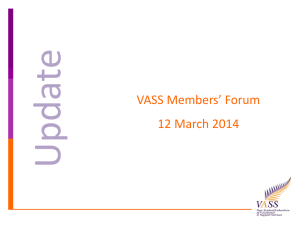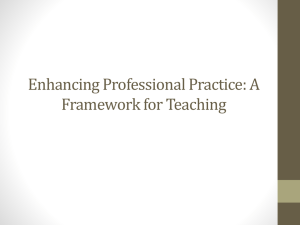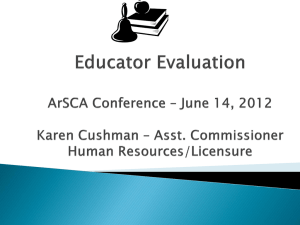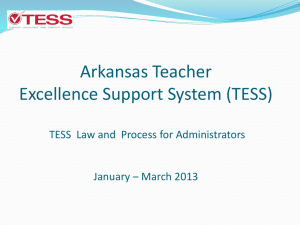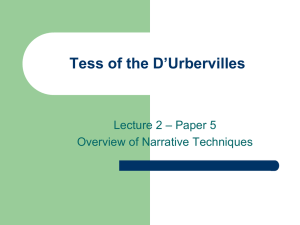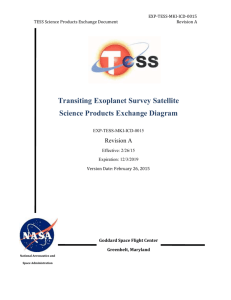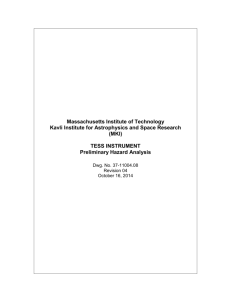Evaluation Policy Update Explanation
advertisement
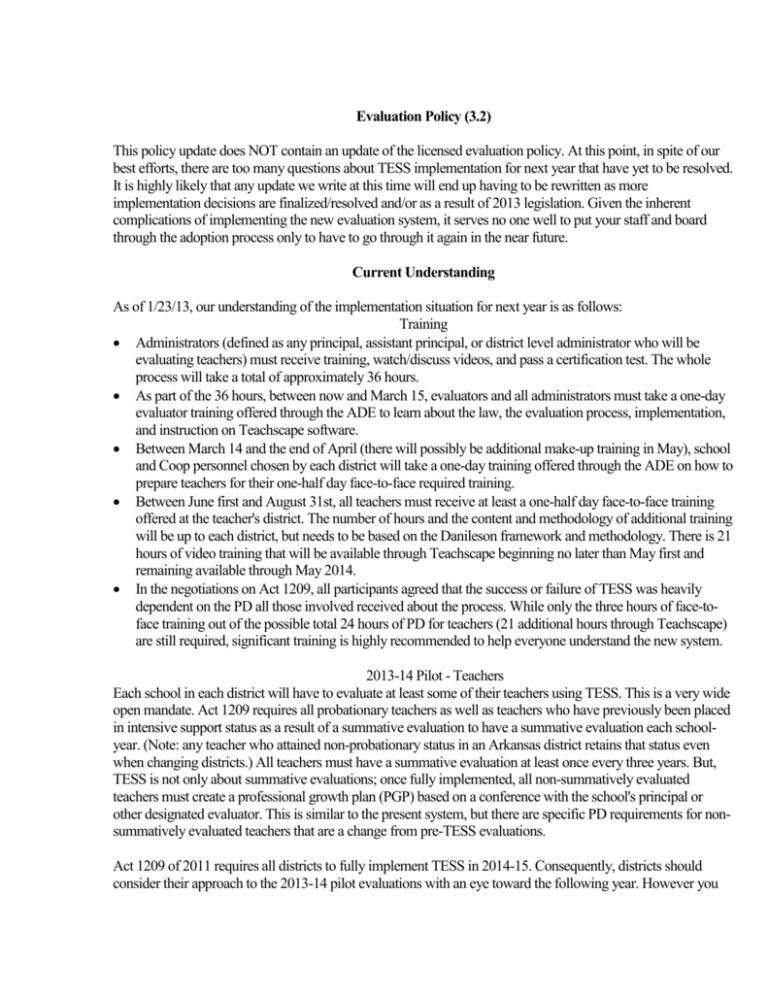
Evaluation Policy (3.2) This policy update does NOT contain an update of the licensed evaluation policy. At this point, in spite of our best efforts, there are too many questions about TESS implementation for next year that have yet to be resolved. It is highly likely that any update we write at this time will end up having to be rewritten as more implementation decisions are finalized/resolved and/or as a result of 2013 legislation. Given the inherent complications of implementing the new evaluation system, it serves no one well to put your staff and board through the adoption process only to have to go through it again in the near future. Current Understanding As of 1/23/13, our understanding of the implementation situation for next year is as follows: Training Administrators (defined as any principal, assistant principal, or district level administrator who will be evaluating teachers) must receive training, watch/discuss videos, and pass a certification test. The whole process will take a total of approximately 36 hours. As part of the 36 hours, between now and March 15, evaluators and all administrators must take a one-day evaluator training offered through the ADE to learn about the law, the evaluation process, implementation, and instruction on Teachscape software. Between March 14 and the end of April (there will possibly be additional make-up training in May), school and Coop personnel chosen by each district will take a one-day training offered through the ADE on how to prepare teachers for their one-half day face-to-face required training. Between June first and August 31st, all teachers must receive at least a one-half day face-to-face training offered at the teacher's district. The number of hours and the content and methodology of additional training will be up to each district, but needs to be based on the Danileson framework and methodology. There is 21 hours of video training that will be available through Teachscape beginning no later than May first and remaining available through May 2014. In the negotiations on Act 1209, all participants agreed that the success or failure of TESS was heavily dependent on the PD all those involved received about the process. While only the three hours of face-toface training out of the possible total 24 hours of PD for teachers (21 additional hours through Teachscape) are still required, significant training is highly recommended to help everyone understand the new system. 2013-14 Pilot - Teachers Each school in each district will have to evaluate at least some of their teachers using TESS. This is a very wide open mandate. Act 1209 requires all probationary teachers as well as teachers who have previously been placed in intensive support status as a result of a summative evaluation to have a summative evaluation each schoolyear. (Note: any teacher who attained non-probationary status in an Arkansas district retains that status even when changing districts.) All teachers must have a summative evaluation at least once every three years. But, TESS is not only about summative evaluations; once fully implemented, all non-summatively evaluated teachers must create a professional growth plan (PGP) based on a conference with the school's principal or other designated evaluator. This is similar to the present system, but there are specific PD requirements for nonsummatively evaluated teachers that are a change from pre-TESS evaluations. Act 1209 of 2011 requires all districts to fully implement TESS in 2014-15. Consequently, districts should consider their approach to the 2013-14 pilot evaluations with an eye toward the following year. However you choose which teachers to summatively evaluate in 2013-14, it needs to be defensibly unbiased as it relates to the selection criteria/process. While, theoretically, about 1/3 of your teachers will be summatively evaluated each year, there is no statutory provision for how to initially divide your employees into thirds to start the rotation process. One advantage to implementing TESS this year is that you can use your district's growth assessments for evaluation purposes rather than TESS mandatory state determined growth assessments (they haven't been finalized at this time). You could choose to evaluate any third of the employees on a rotation that makes sense to you. One option would be to use each employee's RIF points as the determination factor and base your selection going from highest to lowest or lowest to highest. You could also draw names out of a hat (be sure to have a PPC observer present at the selection). Yet another option would be to recruit volunteers. We strongly advise against an arbitrary system (indefensible) that "somehow" magically selects your weakest teachers. Another significant issue is whether you will use the summative evaluations conducted in the pilot for employment purposes. Since it is a pilot, it is not mandatory that you do so; it is possible to go through the process so that those involved will get the experience with less at stake on the outcome. This approach, however, would necessitate that the same employees who had a summative evaluation would also have to be evaluated under you current evaluation system which would be an additional time burden on everyone. Using the pilot's summative evaluations for employment considerations places additional emphasis on the need to have a defensible methodology for the selection criteria of those to be summatively evaluated. The credentialing of the evaluators becomes important in this respect. Currently, all evaluators will have to pass a certification test to be qualified to actually do a summative evaluation. There is much discussion on this issue and it's possible some of the specifics may change. 2013-14 Pilot - Principals and Assistant Principals Superintendents, assistant superintendents, principals, and anyone else who will be evaluating principals are required to attend a two-day training that is being offered in July and early August. Act 1209 of 2011 has a total of one paragraph concerning the evaluation of administrators. While several principal evaluation documents are on the ADE website (including an evaluation rubric and sample forms to use), there is little statutory guidance on the evaluation's requirements and essentially none on assistant principal evaluations. At this time, we believe you should review the documents available on the ADE's website and determine how you will proceed in the 2013-14 school year. This could range anywhere from evaluating all principals under the new system, to evaluating only a few under the new system with the rest being evaluated under your current system. Our understanding of the Department's position is that at least some principals have to be evaluated under the new system. Bottom Lines In spite of ADE's best efforts, there is much about TESS that remains unsettled. There are sufficient rumors about possible tweaks to TESS, that we believe there is a high probability the policies will have to be amended after the session. Amending the policies now only to have to amend them again in two or three months is not helpful to anyone. I also acknowledge that the rumors may or may not come to fruition, but that doesn't negate the high degree of uncertainty presently concerning TESS. I will amend the policies as soon as I believe there has been sufficient resolution of the implementation issues. In the meantime, I strongly recommend informing your staff of the bottleneck surrounding implementation so that, if there is an adoption process time crunch, they will understand that you have not been holding off or trying to hide anything. Amending the teacher evaluation policy, if it is required by a change in the law, will not trigger contract rescission under 6-17-204 provided the process is completed by June 30. For those districts not wishing to wait to amend your evaluation policy, I recommend making any changes to your policy as brief as possible. Between Act 1209 and the Rules, there doesn't need to be much to be fleshed out in policy. The real "meat" should be in procedures; the how, when, and process/sequence of the process. I would use policy amendment to cover the "who" will be summatively evaluated and what the results of the evaluation mean in terms of employment and PD in general. To the extent that your district retains your current evaluation system for any employees, be sure and spell that out in your policy; keep your current language, but amend it to say to whom it will apply.
